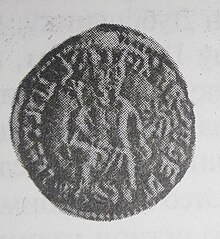This article needs additional citations for verification. (May 2011) |
Konstantin Balšić (Serbian Cyrillic: Константин Балшић; Albanian: Kostandin Balsha)[1] or Kostandin Balsha (fl. 1378–died 1402), was a lord of the Balsha family, who ruled over lands in northern Albania.
Konstantin Balšić Kostandin Balsha | |
|---|---|
| Lord of Krujë | |
 Coin of Kostandin Balsha featuring his portrait. It is the only type of coin which he minted. | |
| Reign | 1394–1402 |
| Successor | Helena Thopia |
| Died | 1402 Durrës, Republic of Venice |
| Noble family | Balsha |
| Spouse | Helena Thopia |
| Issue | Stefan Balšić "Maramonte" |
| Father | Đurađ I Balšić |
| Mother | Teodora Dejanović |
Life
editKonstantin was the son of Đurađ I Balšić, the Lord of Zeta (r. 1362–1378) and his wife, Teodora Dejanović (the daughter of despot Dejan). After his father's death in 1378, he inherited a small parcel of land between the rivers of Bojana and Drin.
To expand links in the western Balkans, he married his sister Eudokia to the Florentine Despot of Ioannina Esau de' Buondelmonti.
In late 1394, Konstantin was installed as governor of Krujë by the Ottomans and married Marco Barbarigo's first wife, the Albanian princess Helena Thopia, daughter of Karl Thopia. Helena was Konstantin's first cousin as Helena's mother Vojislava and Konstantin's father Đurađ were brother and sister. Helena's maternal grandfather and Konstantin's paternal grandfather was Balša I. He was sent to become the Balsha's head as an Ottoman protégé and apparently failed, losing his stronghold, Dagnum, to his cousin, Đurađ II, in 1395.[2]
Konstantin was very faithful to Sultan Bayezid I. On 17 May 1395 he fought in the Battle of Rovine and witnessed the deaths of some Serb noblemen but managed to survive himself. Of those who died included his cousin Konstantin Dejanović, after whom he was named, and King Marko Mrnjavčević.
In a Venetian document dating 8 August 1401, he is mentioned as "Konstantin, lord of Serbia, in the territory around our territory of Durachi (Durrës)" (Constantini domini Servie, teritorii, quod est circa teritorium nostrum Durachii).[3] In 1402, he was executed in Durazzo for unknown reasons, but it is generally believed that his absence at the Battle of Ankara had something to do with this. After Konstantin's death his wife Helena and their son Stefan first went to Venetians and then lived with her sister Maria. Since Maria was married to Filip Maramonte, the Venetians and Ragusans often referred to Stefan Balsha as "Stefan Maramonte".[4] In 1920 Yugoslav historian Milan Šufflay published, under pseudonym Alba Limi, a historical novel about Kostandin Balsha.[5]
See also
edit| Ancestors of Konstantin Balšić | |||||||||||||||||||||||||||||||||||||||||||||||||||||||||||||||||||||||||||||||||||||||||||||||||||||||||||||||||||||||||||||||||||||||||||||||||||||||||||||||||||||||||||||||||||||||||||||||||||||||||||||||||||||||||||||||||||||||||||||||||||||||||||||||||||||||||||||||||||||||||||||||||||||||||||||||||||||||||||||||||||||||||||||||||||||||||||||||||||||||||||||||||||||||||||||||||||||||||||||||||||||||||||||||||||||||||||||||||||||||||||||||||||||||||||||||||||||||||||||||||||||||||||||||||||||||||||||||||||||||||||||||||||||||||||||
|---|---|---|---|---|---|---|---|---|---|---|---|---|---|---|---|---|---|---|---|---|---|---|---|---|---|---|---|---|---|---|---|---|---|---|---|---|---|---|---|---|---|---|---|---|---|---|---|---|---|---|---|---|---|---|---|---|---|---|---|---|---|---|---|---|---|---|---|---|---|---|---|---|---|---|---|---|---|---|---|---|---|---|---|---|---|---|---|---|---|---|---|---|---|---|---|---|---|---|---|---|---|---|---|---|---|---|---|---|---|---|---|---|---|---|---|---|---|---|---|---|---|---|---|---|---|---|---|---|---|---|---|---|---|---|---|---|---|---|---|---|---|---|---|---|---|---|---|---|---|---|---|---|---|---|---|---|---|---|---|---|---|---|---|---|---|---|---|---|---|---|---|---|---|---|---|---|---|---|---|---|---|---|---|---|---|---|---|---|---|---|---|---|---|---|---|---|---|---|---|---|---|---|---|---|---|---|---|---|---|---|---|---|---|---|---|---|---|---|---|---|---|---|---|---|---|---|---|---|---|---|---|---|---|---|---|---|---|---|---|---|---|---|---|---|---|---|---|---|---|---|---|---|---|---|---|---|---|---|---|---|---|---|---|---|---|---|---|---|---|---|---|---|---|---|---|---|---|---|---|---|---|---|---|---|---|---|---|---|---|---|---|---|---|---|---|---|---|---|---|---|---|---|---|---|---|---|---|---|---|---|---|---|---|---|---|---|---|---|---|---|---|---|---|---|---|---|---|---|---|---|---|---|---|---|---|---|---|---|---|---|---|---|---|---|---|---|---|---|---|---|---|---|---|---|---|---|---|---|---|---|---|---|---|---|---|---|---|---|---|---|---|---|---|---|---|---|---|---|---|---|---|---|---|---|---|---|---|---|---|---|---|---|---|---|---|---|---|---|---|---|---|---|---|---|---|---|---|---|---|---|---|---|---|---|---|---|---|---|---|---|---|---|---|---|---|---|---|---|---|---|---|---|---|---|---|---|---|---|---|---|---|---|---|---|---|---|---|---|---|---|---|---|---|---|---|---|---|---|---|---|---|---|---|---|---|---|---|---|---|---|---|---|---|---|---|---|---|---|---|---|---|---|---|---|---|---|---|---|---|---|---|---|---|---|---|---|---|---|---|---|---|---|---|---|---|---|---|---|---|---|---|---|---|---|---|---|---|---|---|---|---|---|---|---|---|---|---|---|---|---|---|---|---|---|---|---|---|---|---|---|---|
| |||||||||||||||||||||||||||||||||||||||||||||||||||||||||||||||||||||||||||||||||||||||||||||||||||||||||||||||||||||||||||||||||||||||||||||||||||||||||||||||||||||||||||||||||||||||||||||||||||||||||||||||||||||||||||||||||||||||||||||||||||||||||||||||||||||||||||||||||||||||||||||||||||||||||||||||||||||||||||||||||||||||||||||||||||||||||||||||||||||||||||||||||||||||||||||||||||||||||||||||||||||||||||||||||||||||||||||||||||||||||||||||||||||||||||||||||||||||||||||||||||||||||||||||||||||||||||||||||||||||||||||||||||||||||||||
References
edit- ^ Schmitt, Oliver Jens (2001), Das venezianische Albanien (1392-1479), München: R. Oldenbourg Verlag GmbH München, p. 186, ISBN 3-486-56569--9
- ^ Anamali, Skënder and Prifti, Kristaq. Historia e popullit shqiptar në katër vëllime. Botimet Toena, 2002, ISBN 99927-1-622-3 pp. 251–252
- ^ Monumenta spectantia Historiam Slavorum Meridionalium. 1874. pp. 437–.
- ^ M. Bešić, Zarij (1970). Istorija Crne Gore /2. Crna gora u doba oblasnih gospodara (in Serbian). Titograd: Redakcija za istoiju Crne Gore. p. 119. OCLC 175122851.
...може се као доста поуздано прихватити дшшљење да је Стефан Балшић Марамонте био син Конставл-ина Балшића и Јелене Тогшје....његова је удовица отишла у Млетке, а затим се повуклакод своје рођаке Марије Топија, удате за Фшшпа Марамонте...Ду-бровчани и Млечани често називали Стефан Марамонте.
- ^ Elsie, Robert (2013). A Biographical Dictionary of Albanian History. I.B.Tauris. p. 28. ISBN 978-1-78076-431-3.
Croat historian Milan von Šufflay (using the pseudonym Alba Limi) wrote a three-part historical novel about him, Kostadin Balšić, Zagreb 1920. BALSHA, GEORGE I ( -01.1378) Mediaeval Serbian ruler.